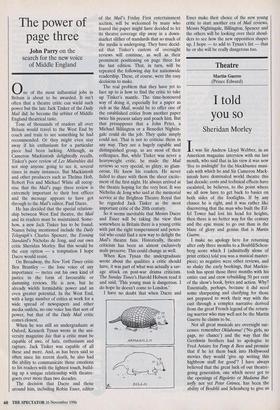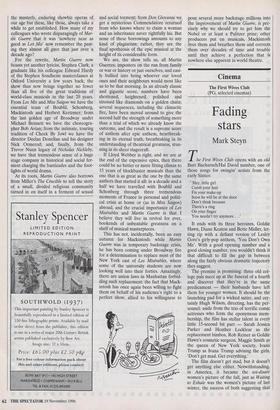Theatre
Martin Guerre (Prince Edward)
I told you so
Sheridan Morley
It was Sir Andrew Lloyd Webber, in an American magazine interview with me last month, who said that in his view it was now `five to midnight' for the blockbuster musi- cals with which he and Sir Cameron Mack- intosh have dominated world theatre this last decade: costs and technical effects have escalated, he believes, to the point where we all now have to get back to basics on both sides of the footlights. If by any chance he is right, and it was rather like discovering that the man who built the Eif- fel Tower had lost his head for heights, then there is no better way for the century and the epic music to go out than in the blaze of glory and genius that is Martin Guerre.
I make no apology here for returning after only three months to a Boublil/Schon- berg score which I (admittedly alone of print critics) told you was a musical master- piece; so negative were other reviews, and so shaky the early bookings, that Mackin- tosh has spent those three months with his entire cast and crew rebuilding 50 per cent of the show's book, lyrics and action. Why? Essentially, perhaps, because it did need some sharpening and clarifying for those not prepared to work their way with the cast through a complex narrative derived from the great French legend of the return- ing warrior who may well not be the Martin Guerre he claims to be.
Not all great musicals are overnight suc- cesses: remember Oklahoma! (`No girls, no gags, no chance') and the way that the Gershwin brothers had to apologise to Fred Astaire for Porgy & Bess and promise that if he let them back into Hollywood movies they would 'give up writing this highbrow stuff for good'? I have always believed that the great luck of our theatre- going generation, one which never got to the openings of Rigoletto or Madama But- terfly nor yet Peter Grimes, has been the ability of Boublil and Schonberg to give us the masterly, enduring showbiz operas of our age but these, like those, always take a while to get established. How many of my colleagues who wrote disparagingly of Mar- tin Guerre that it was 'nowhere near as good as Les Mis' now remember the past- ing they almost all gave that just over a decade ago?
For the rewrite, Martin Guerre now boasts yet another lyricist, Stephen Clark, a graduate like his colleague Edward Hardy of the Stephen Sondheim masterclasses at Oxford University a few years back; the show thus now brings together no fewer than all five of the great traditions of world-class musicals in the last 20 years. From Les Mis and Miss Saigon we have the essential team of Boublil, Schonberg, Mackintosh and Herbert Kretzmer; from the last golden age of Broadway under Michael Bennett we have the choreogra- pher Bob Avian; from the intimate, touring tradition of Cheek By Jowl we have the director Declan Donellan and his designer Nick Ormerod; and, finally, from the Trevor Nunn legacy of Nicholas Nickleby, we have that tremendous sense of a huge stage company in historical and social fer- ment charging the barricades and the foot- lights of world drama.
At its roots, Martin Guerre also borrows from Miller's The Crucible to tell the story of a small, divided religious community turned in on itself in a ferment of sexual and social torment; from Don Giovanni we get a mysterious Commendatore returned from who knows where to claim a woman and an inheritance never rightfully his. But none of these borrowings amounts to any kind of plagiarism: rather, they are the final apotheosis of the epic musical at the height of its considerable form.
We are, the show tells us, all Martin Guerres: imposters on the run from family or war or history or just ourselves, and easi- ly bullied into being whoever our loved ones and their neighbours would most like us to be that morning. In an already classic and gigantic score, numbers have been shortened, heightened, polished and stressed like diamonds on a golden chain; several sequences, including the climactic fire, have been moved around to give the second half the strength of something more than a trial of which we already know the outcome, and the result is a supreme score of anthem after epic anthem, heartbreak- ing in its eternal truth, breathtaking in its understanding of theatrical greatness, stun- ning in its sheer stagecraft.
If Lloyd Webber is right, and we are at the end of the expensive epics, then there could be no better or more fitting climax to 15 years of blockbuster musicals than the one that is as great as the one by the same authors that started it all: in a decade and a half we have travelled with Boublil and Schonberg through three tremendous moments of France in personal and politi- cal crisis at home or (as in Miss Saigon) abroad, and the crucial importance of Les Miserables and Martin Guerre is that I believe they will live in revival for ever, bookends of unbeatable greatness on a shelf of musical masterpieces.
This has not, incidentally, been an easy autumn for Mackintosh: while Martin Guerre was in temporary backstage crisis, he has been coming under Broadway fire for a determination to replace most of the New York cast of Les Miserables, where some of the university students are now looking well into their forties. Amazingly, there are union laws in Manhattan forbid- ding such replacement: the fact that Mack- intosh has once again been willing to fight them on behalf of his audience's right to a perfect show, allied to his willingness to pour several more backstage millions into the improvement of Martin Guerre, is pre- cisely why we should try to get him the Nobel or at least a Pulitzer prize; other producers put on musicals, Mackintosh lives them and breathes them and corrects them over decades of time and trouble until they achieve a perfection that is nowhere else apparent in world theatre.



















































































 Previous page
Previous page